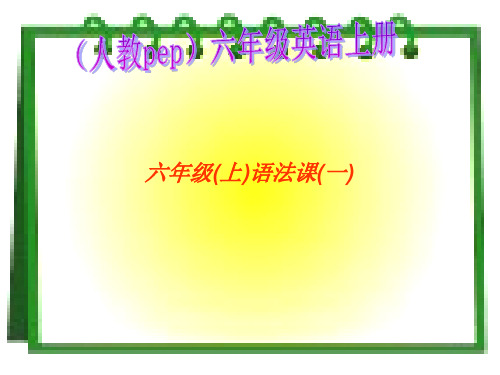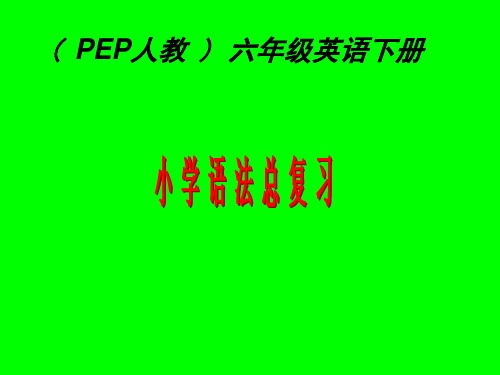《六年级英语语法课件》
合集下载
小学六年级英语语法轻轻ppt课件

.
❖ 集体名词,以单数形式出现,但实为复数。 如: people police cattle 等本身就是复数, 不能说 a people,a police,a cattle,但可 以说 a person,a policeman,a head of cattle,the English,the British,the French, the Chinese,the Japanese,the Swiss 等 名词,表示国民总称时,作复数用。 如: The Chinese are industries and brave. 中国 人民是勤劳勇敢的
.
❖ 动词第三人称单数变化: ①be的第一人称单数形式 为am,第三人称单数形式为is, 其他人称形式为are. ②have的三人称单数为has. ③一般动词三人称单 数形式是在动词原形后加s或es. 加-es的动词规则 (注意:名词变复数也是加s或es): ①在动词后加s ② 以s、x、ch、sh结尾的词,若发咝音就加es ③以” 辅音+o”结尾的词要加”es”,如goes, does, potatoes; 以”元音+o”结尾的词,直接加s. ④部分以f或fe结尾 的名词变复数时要将f变v再加”es”,如knife (knives), wife (wives)
.
❖ 一些不规则动词的变化: am, is (was); are (were); have, has (had); go (went); eat (ate) buy (bought); do (did); ski (skied); make (made) see (saw) leave (left) take (took) study (studied) swim (swam) sing(sang) 一般过去时态如何 将肯定句变成一般疑问句? ①一种是有be动词的,即有was或 were,只要把was或 were 提到 句首, 把句中第一人称转为第 二人称,即I, we变you, my和our变 your,然后把句中剩下的 单词依次抄下来. 如:It was a windy day.--Was it a windy day? That was my bag.---Was that your bag? ②另一种是 无be动词的句子,需要助动词来帮忙。把过去时态的 助动 词did放在句首,把第一人称改为第二人称,然后把剩下的 句子依次抄下来,在抄的过程中,要把动词的过去时转变成 原形。如I went fishing yesterday.---Did you go fishing yesterday?
❖ 集体名词,以单数形式出现,但实为复数。 如: people police cattle 等本身就是复数, 不能说 a people,a police,a cattle,但可 以说 a person,a policeman,a head of cattle,the English,the British,the French, the Chinese,the Japanese,the Swiss 等 名词,表示国民总称时,作复数用。 如: The Chinese are industries and brave. 中国 人民是勤劳勇敢的
.
❖ 动词第三人称单数变化: ①be的第一人称单数形式 为am,第三人称单数形式为is, 其他人称形式为are. ②have的三人称单数为has. ③一般动词三人称单 数形式是在动词原形后加s或es. 加-es的动词规则 (注意:名词变复数也是加s或es): ①在动词后加s ② 以s、x、ch、sh结尾的词,若发咝音就加es ③以” 辅音+o”结尾的词要加”es”,如goes, does, potatoes; 以”元音+o”结尾的词,直接加s. ④部分以f或fe结尾 的名词变复数时要将f变v再加”es”,如knife (knives), wife (wives)
.
❖ 一些不规则动词的变化: am, is (was); are (were); have, has (had); go (went); eat (ate) buy (bought); do (did); ski (skied); make (made) see (saw) leave (left) take (took) study (studied) swim (swam) sing(sang) 一般过去时态如何 将肯定句变成一般疑问句? ①一种是有be动词的,即有was或 were,只要把was或 were 提到 句首, 把句中第一人称转为第 二人称,即I, we变you, my和our变 your,然后把句中剩下的 单词依次抄下来. 如:It was a windy day.--Was it a windy day? That was my bag.---Was that your bag? ②另一种是 无be动词的句子,需要助动词来帮忙。把过去时态的 助动 词did放在句首,把第一人称改为第二人称,然后把剩下的 句子依次抄下来,在抄的过程中,要把动词的过去时转变成 原形。如I went fishing yesterday.---Did you go fishing yesterday?
人教版(PEP)英语六年级上册专项复习——语法(一)课件

show next Friday. 7. May _i_s__ _g_o_in_g_ __t_o__ _vi_s_it__(visit) her grandparents
tomorrow.
Thank You
→ _I__w_i_ll_n__o_t _g_o_t_o_B__e_ij_in_g__n_e_x_t_y_e_a_r_. ___________
2.一般疑问句: be动词(am, is, are)+主语+going to + 动词原形+其他? Will+主语+动词原形+其他? be或will提到句首,some改为any, and改为or,第一二 人称互换。
She is going to Shanghai by plane. → _H__o_w_i_s_s_h_e__g_o_in_g__to__S_h_a_n_g_h_a_i_?__________
请你填空
1. 我打算明天和家人去野炊。 I_a_m___ _g_o_i_n_g_ ___to___ have a picnic with my family. I _w_i_ll__have a picnic with my friends.
主语+be动词(am, is, are)+not+going to + 动词原 形+其他
主语+will+not+动词原形+其他(will not=won't)
考考你,将下列句子变成否定句。 I’m going to have a picnic this afternoon
→ _I_’m___n_o_t_g_o_in__g_t_o_h_a_v_e__a_p_i_c_n_ic__t_h_is_a_f_t_e_r_n_o_o_n_._ I will go to Beijing next year.
tomorrow.
Thank You
→ _I__w_i_ll_n__o_t _g_o_t_o_B__e_ij_in_g__n_e_x_t_y_e_a_r_. ___________
2.一般疑问句: be动词(am, is, are)+主语+going to + 动词原形+其他? Will+主语+动词原形+其他? be或will提到句首,some改为any, and改为or,第一二 人称互换。
She is going to Shanghai by plane. → _H__o_w_i_s_s_h_e__g_o_in_g__to__S_h_a_n_g_h_a_i_?__________
请你填空
1. 我打算明天和家人去野炊。 I_a_m___ _g_o_i_n_g_ ___to___ have a picnic with my family. I _w_i_ll__have a picnic with my friends.
主语+be动词(am, is, are)+not+going to + 动词原 形+其他
主语+will+not+动词原形+其他(will not=won't)
考考你,将下列句子变成否定句。 I’m going to have a picnic this afternoon
→ _I_’m___n_o_t_g_o_in__g_t_o_h_a_v_e__a_p_i_c_n_ic__t_h_is_a_f_t_e_r_n_o_o_n_._ I will go to Beijing next year.
小学六年级英语语法总复习PPT课件

.
• 小学阶段不规则动词全表
• Infinitive Past tense Infinitive
• 1. am, is
was
2. keep
• 3.are
were
5. make made
4.become
7. blow
blew
8. read
• 9. buy
bought
10. ride
• 11. catch caught
fly-flying walk-walking
jump-jumping sleep-sleeping
climb-climbing fight-fighting
swing-swinging drink-drinking catch-catching pick-picking
watch-watching play-playing
dance danced
变y为 i+ed
study studied
动词的过去式(不规则)
go-went read-read eat-ate sing-sang take-took buy-bought see-saw swim-swam am,is-was do-did are-were have-had get-got leave-left fly-flew stop-stopped(双写)
.
• 一般现在时的变化
1. be动词的变化。
否定句:主语+ be + not +其它。 如:He is not a worker.他不是工人 一般疑问句:Be +主语+其它。 如:-Are you a student? -Yes. I am. / No, I‘m not. 特殊疑问句:疑问词+一般疑问句。如:Where is my bike?
• 小学阶段不规则动词全表
• Infinitive Past tense Infinitive
• 1. am, is
was
2. keep
• 3.are
were
5. make made
4.become
7. blow
blew
8. read
• 9. buy
bought
10. ride
• 11. catch caught
fly-flying walk-walking
jump-jumping sleep-sleeping
climb-climbing fight-fighting
swing-swinging drink-drinking catch-catching pick-picking
watch-watching play-playing
dance danced
变y为 i+ed
study studied
动词的过去式(不规则)
go-went read-read eat-ate sing-sang take-took buy-bought see-saw swim-swam am,is-was do-did are-were have-had get-got leave-left fly-flew stop-stopped(双写)
.
• 一般现在时的变化
1. be动词的变化。
否定句:主语+ be + not +其它。 如:He is not a worker.他不是工人 一般疑问句:Be +主语+其它。 如:-Are you a student? -Yes. I am. / No, I‘m not. 特殊疑问句:疑问词+一般疑问句。如:Where is my bike?
小学六年级英语语法复习ppt课件

• ③表示动作的方向、目标: Let me have a look at the picture 让我看看这幅图。
• ④用于某些固定搭配: at once 立刻、马上 at last 最后 look at 看
• at the same time 同时 at first 开始时
• not at all 一点也不
.
• 2.行为动词:主语+行为动词(+其它)。如: We study English.我们学习英语。 当主语为第三人称单数(he, she,it)
时,要在动词后加"-s"或"-es"。如: Mary likes Chinese.玛丽喜欢汉语。
.
• 二、用括号内动词的适当形式填空。 1. He often ________(have) dinner at home. 2. Daniel and Tommy _______(be) in Class One. 3. We _______(not watch) TV on Monday. 4. Nick _______(not go) to the zoo on Sunday. 5. ______ they ________(like) the World Cup?
B, An
• 8, Do you know ___ lady over there in a red coat? A,
a
B, an
C, the . D,/
• 常用介词的基本用法
• at • ①表示时间: I go to school at seven every
day 我每天早上7点去上学。
• ②表示在某一具体地点: He is standing at the bus stop 他站在公共汽车站。
• ④用于某些固定搭配: at once 立刻、马上 at last 最后 look at 看
• at the same time 同时 at first 开始时
• not at all 一点也不
.
• 2.行为动词:主语+行为动词(+其它)。如: We study English.我们学习英语。 当主语为第三人称单数(he, she,it)
时,要在动词后加"-s"或"-es"。如: Mary likes Chinese.玛丽喜欢汉语。
.
• 二、用括号内动词的适当形式填空。 1. He often ________(have) dinner at home. 2. Daniel and Tommy _______(be) in Class One. 3. We _______(not watch) TV on Monday. 4. Nick _______(not go) to the zoo on Sunday. 5. ______ they ________(like) the World Cup?
B, An
• 8, Do you know ___ lady over there in a red coat? A,
a
B, an
C, the . D,/
• 常用介词的基本用法
• at • ①表示时间: I go to school at seven every
day 我每天早上7点去上学。
• ②表示在某一具体地点: He is standing at the bus stop 他站在公共汽车站。
小学六年级英语语法复习ppt课件

小学六年级英语
.
.
.
.
• 写出下列各词的复数 I _________him _________this ___________her ______ watch _______child _______photo ________diary ______
man______ woman_______ paper_______ juice___________ water________ milk________ rice__________ tea__________
.
• 2.行为动词:主语+行为动词(+其它)。如: We study English.我们学习英语。 当主语为第三人称单数(he, she,it)
时,要在动词后加"-s"或"-es"。如: Mary likes Chinese.玛丽喜欢汉语。
.
• 二、用括号内动词的适当形式填空。 1. He often ________(have) dinner at home. 2. Daniel and Tommy _______(be) in Class One. 3. We _______(not watch) TV on Monday. 4. Nick _______(not go) to the zoo on Sunday. 5. ______ they ________(like) the World Cup?
• 6, 用在序数词,方位词前和形容词最高级前, the first , the east, the tallest
.
• 3、零冠词(不用定冠词) (1)名词前已有作定语用的this, that, these, those, my, your, his, her, our, their, some等限 定词时,不用冠词。如:this eraser, her pencilbox, some boxes, those women等。 (2)泛指的不可数名词前一般不用冠词。如:meat, rice, water, bread, tea, milk, juice等。 (3)复数名词表示泛指时,不用冠词。如: the people in the room are doctors. 房间里的那 些人是医生。 (4)在表示学科的名词前一般不用冠词。如: Chinese, English, math, physics, history等。在 三餐饭和球类运动名词前一般不加冠词。如:have breakfast/ lunch/ supper, play basketball/ football等。 (5)在季节、节日、星期、月份前不用冠词。如: autumn, summer, winter, spring, Teachers’ day, Children’s day, Sunday, February等。 (6)在表颜色、语种和国家名词前不用冠词。如: white, brown, French, Australia等。 (7)在表示称呼语的名词之前,以及职务、头衔的 名词前不用冠词。如:Docto.r green is a scientist. 格林博士是位科学家。
.
.
.
.
• 写出下列各词的复数 I _________him _________this ___________her ______ watch _______child _______photo ________diary ______
man______ woman_______ paper_______ juice___________ water________ milk________ rice__________ tea__________
.
• 2.行为动词:主语+行为动词(+其它)。如: We study English.我们学习英语。 当主语为第三人称单数(he, she,it)
时,要在动词后加"-s"或"-es"。如: Mary likes Chinese.玛丽喜欢汉语。
.
• 二、用括号内动词的适当形式填空。 1. He often ________(have) dinner at home. 2. Daniel and Tommy _______(be) in Class One. 3. We _______(not watch) TV on Monday. 4. Nick _______(not go) to the zoo on Sunday. 5. ______ they ________(like) the World Cup?
• 6, 用在序数词,方位词前和形容词最高级前, the first , the east, the tallest
.
• 3、零冠词(不用定冠词) (1)名词前已有作定语用的this, that, these, those, my, your, his, her, our, their, some等限 定词时,不用冠词。如:this eraser, her pencilbox, some boxes, those women等。 (2)泛指的不可数名词前一般不用冠词。如:meat, rice, water, bread, tea, milk, juice等。 (3)复数名词表示泛指时,不用冠词。如: the people in the room are doctors. 房间里的那 些人是医生。 (4)在表示学科的名词前一般不用冠词。如: Chinese, English, math, physics, history等。在 三餐饭和球类运动名词前一般不加冠词。如:have breakfast/ lunch/ supper, play basketball/ football等。 (5)在季节、节日、星期、月份前不用冠词。如: autumn, summer, winter, spring, Teachers’ day, Children’s day, Sunday, February等。 (6)在表颜色、语种和国家名词前不用冠词。如: white, brown, French, Australia等。 (7)在表示称呼语的名词之前,以及职务、头衔的 名词前不用冠词。如:Docto.r green is a scientist. 格林博士是位科学家。
英语六年级下册语法课件

动词过去式变化规则: 1.一般在动词末尾加-ed,如:pullpulled, cook-cooked
2.结尾是e加d,如:taste-tasted 3.末尾只有一个元音字母和一个辅音字 母的重读闭音节,应双写末尾的辅音字母, 再加-ed,如:stop-stopped 4.以“辅音字母+y”结尾的,变y为i, 再加-ed,如:study-studied
特殊疑问词 what 什么 where 哪里 who 谁 whose 谁的 when 什么时候 how 怎样 which 哪一个 what colour 什 么 颜 色 what day 星 期 几 what date 日期 what class 什么班 why 为什么 what time 什么时候 how many 多少 what subject 什么科目 how much 多少钱 how often 多经常 how long 多长时间 how old 多大 how tall 多高 how heavy 多重
Which season do you like best? Summer. When do you usually get up? I usually get up at 6:30. Whose skirt is this? It’s Amy’s. Why do you like spring best? Because I can plant trees. How are you? I’m fine. / I’m happy. How did you go to Xinjiang? I went to Xinjiang by train.
当主语为第三人称单数时,要用doesn‘t构成 否定句。 如:He doesn't often play. 一般疑问句: Do( Does ) +主语+动词原形+其它。如:Do you often play football?- Yes, I do. / No, I don't. 当主语为第三人称单数时,要用does构成一般 疑问句。 如:- Does she go to work by bike?- Yes, she does. / No, she doesn't.特殊疑问句: 疑问词+一般疑问句。如:How does your father go to work?
语法课PPT课件

How to change the sentence into the general question sentences.(变一般疑问句)
There are be-verbs in the sentence.
1. He is a busy man. 2.Tina ‘s mother is reading.
六年级(上)语法课(一)
Teaching aims
Make the students master the sentence grammar 1.How to change the sentence into the general question sentence. 2.How to add ‘NOT” to the sentencens. 3.How to use verbs. 4.How to use words
There are can,must and should in the sentence.
1.He can have a blue car. 2.You can go there by bus.
3.He must go there tomorrow.
4.We should work hard.
There aren’t be-verbs or can(must,should) in the sentences.
I would like some food.
3.does(do)
He often does homework in the evening.
They do some cleaning on Sunday.
Do exercises.
1.There is some water in the cup. 2.They are teachers. 3.I am working with numbers.
PEP版小学英语六年级下册 小学语法总复习 课件

主格
2 ).人称代词 第一人称 第二人称 第三人称
I , we you he, she , it ,they
宾格
me , us you him , her It them
3 ).形容词性物主代词
主 宾 格: 格: I me my you she he you her him your her his it it its they them their we us our
tall 9.Fangfang is not as ______ (tall) as the other girls. bigger hers 10.My eyes are __________(big) than ______ (she).. heavier 11.Which is _________(heavy), the elephant or the pig? earlier 12.Who gets up _________(early), Tim or Tom?
long 6. Mary’s hair is as _______(long) as Lucy’s. jumps higher 7.Ben ______ (jump) _______(high) than some of the boys in his class.
8.________ Nancy sing __________ (well) than Helen? Does better Yes, she _____. does
D.以“f或fe”结尾变f或fe为v,再加-es knife-knives leaf—leaves(不同于leave-s) E.特例:不规则名词复数man-men woman-women policeman—policemen policewoman-policewomen mouse-mice foot-feet tooth—teeth child-children fish-fish deer—deer sheep—sheep Chinese-Chinese photo—photos radio—radios fish—fishes(鱼类)
